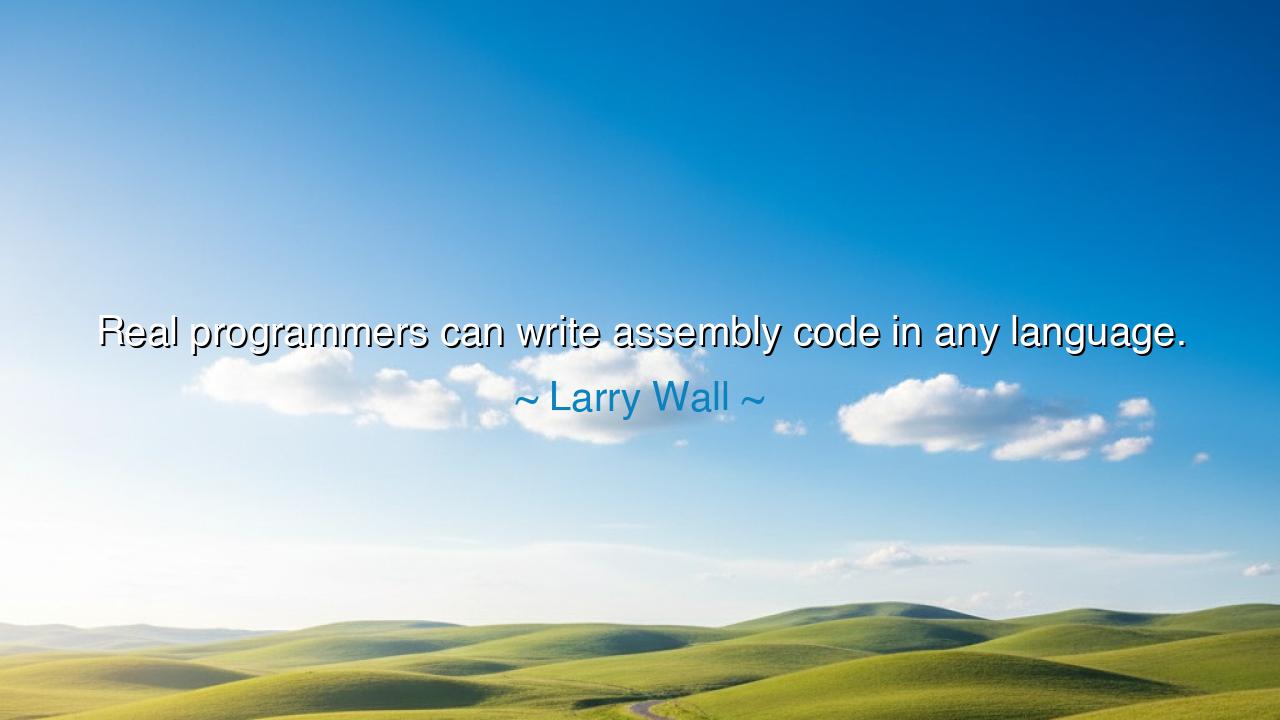
Real programmers can write assembly code in any language.






Hear the jesting wisdom of Larry Wall, creator of the Perl language, who declared: “Real programmers can write assembly code in any language.” Though spoken in humor, the words carry within them a profound truth about mastery, creativity, and the indomitable spirit of those who shape the digital realm. For behind the joke lies a recognition: that the greatest programmers are not bound by the tools they use, but by their ability to bend any tool to their will, even if it means reducing the highest abstractions into the raw bones of the machine.
What is assembly code but the purest tongue of the machine? It is the language of registers, memory addresses, and operations, the closest man comes to speaking directly into the circuits themselves. To write in assembly is to abandon comfort, to labor with precision, to command the machine step by step, without the safety net of abstraction. Wall’s jest implies that true mastery means carrying that spirit into any language, whether lofty and abstract or simple and constrained. A real programmer does not wait for the perfect tool—he makes any tool perform as though it were the lowest, rawest form of power.
History gives us shining examples of this truth. In the days of early computers, there were no rich languages, no user-friendly interfaces. Programmers like Grace Hopper and John Backus had to wrestle with assembly and machine code, building compilers and higher-level languages from raw bits. They showed that genius is not in waiting for convenience, but in creating order from chaos. Later, even when higher-level languages appeared, the great programmers retained the assembly mindset: knowing what the machine truly does, and shaping their code to dance with efficiency and power.
One may laugh at Wall’s remark, but the laughter carries awe. For to write assembly in any language is to reveal a kind of stubborn resilience—a willingness to force a problem into submission, even if it means ignoring the elegant constructs of the language and hammering it into the likeness of raw machine logic. Many have seen this in practice: programmers who write C code as though it were assembly, squeezing every ounce of performance from memory; or those who bend Python or Perl into contorted but powerful forms, achieving what seemed impossible. This is not mere skill, but devotion.
Yet there is also caution in Wall’s humor. For while the real programmer can do such things, the wise programmer asks whether he should. To write assembly in every language is to bring hardship upon oneself and others, making code unreadable, unmaintainable, and difficult to share. It is the path of brilliance but also of peril. The true art lies in knowing when to descend into the raw depths of the machine, and when to embrace the clarity of higher forms.
The lesson is this: do not be a slave to your tools. Learn the foundations—the raw assembly of thought and machine—and then carry that mastery into every language you use. But also learn restraint, so that your power serves not only your pride, but the clarity of your craft. For the greatest programmer is not the one who can write assembly in every language, but the one who knows when to write simply, when to write beautifully, and when to dig deep into the bare metal of the machine.
Practical steps follow: study the fundamentals, not only the latest frameworks. Learn how the machine itself works, so that no language blinds you with illusion. Practice writing clearly, so that others may follow your thought. And when needed, do not fear to descend into the depths, for the true craftsman is at home both in the heights of abstraction and the roots of raw computation.
Thus remember Larry Wall’s jest: “Real programmers can write assembly code in any language.” It is both a celebration of mastery and a warning of hubris. Let it remind you to deepen your craft, to wield every tool with power and humility, and to shape not only code, but wisdom itself, in the service of your fellow man.






AAdministratorAdministrator
Welcome, honored guests. Please leave a comment, we will respond soon